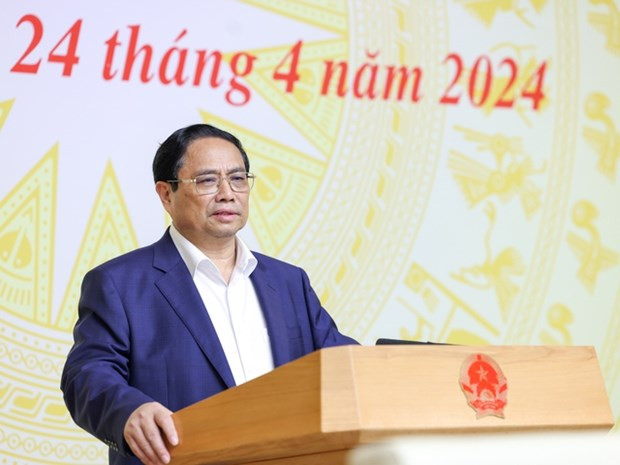
Digital transformation is a key task and a breakthrough in implementing socio-economic development targets, Prime Minister Pham Minh Chinh affirmed while chairing the eighth meeting of the National Committee on Digital Transformation held on April 24 in Hanoi.
Prime Minister Pham Minh Chinh addresses the meeting
In his opening speech, PM Chinh stressed that 2024 can be considered a breakthrough year in carrying out the five-year socio-economic development plan from 2021 to 2025 which focuses on boosting economic growth and structure transformation.
This includes effectively exploiting traditional growth drivers and promoting new growth drivers such as developing the green economy, the circular economy, and the digital economy. This is in addition to promoting national digital transformation, developing a digital government, a digital economy, a digital society, and a digital citizenship.
It is therefore necessary to focus on the strategic breakthroughs of institutions, including institutions related to digital transformation; human resources, especially high-quality human resources, with the focus being human resources for digital transformation and digital infrastructure, he emphasized.
PM Chinh, chairman of the National Committee for Digital Transformation, said that the committee’s working plan for the year is designed to speed up national digital transformation in an effective and practical manner, thereby creating breakthroughs in the country's socio-economic development and contributing to completing all socio-economic targets for 2024 and the 2021 to 2025 period.
The work plan’s objectives include enhancing the responsibility of organisations and individuals, especially leaders of state agencies at all levels in digital transformation, while synchronously and effectively implementing goals and tasks in the National Digital Transformation Programme to 2025 with a vision towards 2030. Other efforts include e-government development strategies towards digital government and the strategy for developing both the digital economy and the digital society.
Under the work plan, 100% of reporting information systems of ministries, sectors, and localities are expected to be connected to the government reporting information system, the centre for information and direction of the Government and the Prime Minister, while 100% of villages and hamlets accessing the national power grid are hoped to have mobile broadband coverage.
Furthermore, 100% of ministries, ministerial-level agencies, governmental agencies, and People's Committees of provinces and centrally-run cities are scheduled to use the management support platform to ensure information security by level.
In the first quarter of the year, the nation set up a new Viettel data centre, providing services to the market. Regarding digital economic development, the Ministry of Information and Communications said that the proportion of digital economy/GDP in 2021 and 2022 stood at 11.91% and 14.26%, respectively. The proportion of the digital economy/GDP in 2023 reached 16.5%, with a growth rate of 20%, a figure three times higher than GDP growth.
EconomySEA report by Google, Temasek, and Bain evaluates the Vietnamese digital economic growth rate as being the fastest in Southeast Asia for two consecutive years, reaching 28% in 2022, and 19% in 2023, 3.5 times higher than the speed of the nation's GDP growth rate.
With this growth rate, it is forecast that the proportion of digital economy/GDP of Vietnam in 2025 will hit over 20%.
Regarding digital society development, the Ministry of Public Security has granted over 86 million chip-embedded identity cards, received over 74.85 million electronic identification records, and activated over 53.62 million electronic identification accounts for people to reach 71.63% of received records. The VNeID app has also integrated eight utility services with 29.3 million visits.
Moreover, 100% of medical examination and treatment facilities have non-cash payment services, 100% of medical training facilities pay cashless tuition fees, about 64% of people enjoy social insurance and unemployment benefits in urban areas through personal accounts, and 77% of adults have payment accounts at banks.
Additionally, a number of major issues relating to the improvement of state management capacity on digital transformation and law enforcement on digital transformation from central to local levels until 2025, with a vision towards 2030, were also touched upon at the meeting.
VOV